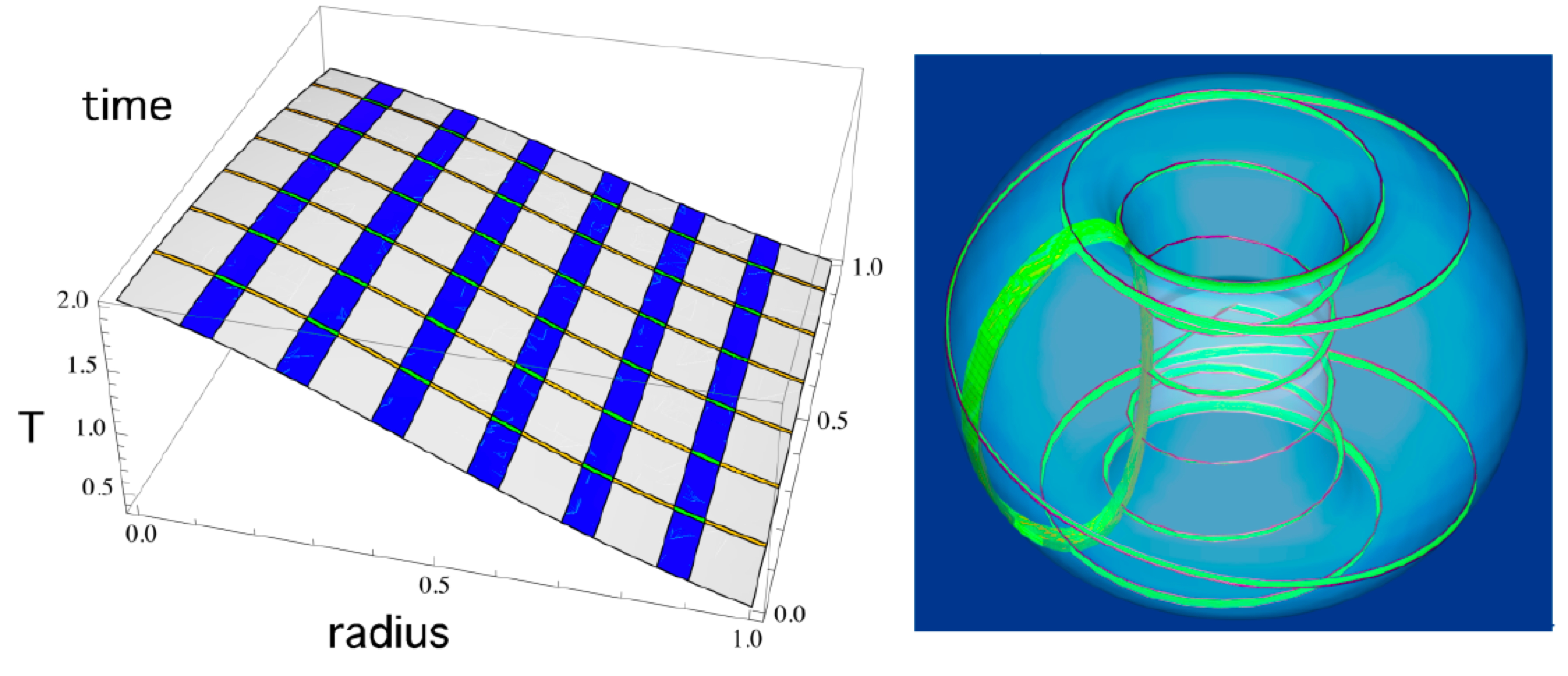For technical information about TRINITY, try here.
For information about GS2, try here
For information about the 'sister project' TGYRO, try here
A fundamental challenge of fusion science is to maximize fusion power, which is determined primarily by macroscopic profiles of density and temperature. These profiles, which vary spatially on the system scale and evolve on the energy confinement time scale, drive turbulence at microscales in space and time. In the absence of MHD instability, this microturbulence is the dominant source of heat flux observed in standard tokamaks, which sets rigid constraints on the macroscopic proles. Consequently, it is of critical importance to understand the self-consistent interaction between the macroscopic profiles and the microturbulence.

The multiscale gyrokinetic transport code TRINITY was created to facilitate this understanding. It exploits the space and time scale separation between mean and fluctuation dynamics to solve for microturbulence on a fine space-time mesh embedded in a coarse space-time grid on which the mean plasma density, flow, and pressure are evolved. A more detailed description of the code is given in the following publications:
M. Barnes, I. G. Abel, W. Dorland, T. Goerler, G. W. Hammett, and F. Jenko, Direct multiscale coupling of a transport code to gyrokinetic turbulence codes, Physics of Plasmas 17, 056109 (2010), arxiv:0912.1974.
M. Barnes, TRINITY: A unified treatment of turbulence, transport, and heating in magnetized plasmas, Ph.D. Thesis (2008), arxiv:0901.2868.
Presentations:
Direct multi-scale coupling of a transport code to gyrokinetic turbulence codes. Invited talk at the National Institute for Fusion Science. Toki (Japan). December 15, 2010.
Shear flow suppression of turbulent transport and self-consistent profile evolution within a multi-scale gyrokinetic framework. Invited poster at the IAEA Fusion Energy Conference. Daejon (South Korea). October 13, 2010.
Momentum transport and flow shear suppression of turbulence in tokamaks (pptx). Invited talk at the Varenna-Lausanne International Workshop on Theory of Fusion Plasmas. Varenna (Italy). September 2, 2010.
Direct multi-scale coupling of a plasma transport code to gyrokinetic turbulence codes. Invited talk at the 2010 Scientific Discovery through Advanced Computing (SciDAC) Conference. Chattanooga, TN (USA). July 12, 2010.
The TRINITY algorithm: local gyrokinetics + global transport = predictive model of core plasma dynamics. Invited lecture for the 2010 EFDA Goal Oriented Training Programme in Theory (GOTiT) Course on transport in tokamaks. Culham Centre for Fusion Energy, Culham (UK). 28 May, 2010.
Direct multi-scale coupling of a transport code to gyrokinetic turbulence codes. Invited talk at Ecole Polytechnique Federale de Lausanne (EPFL). Lausanne (Switzerland). 8 April, 2010.
Direct multi-scale coupling of a transport code to gyrokinetic turbulence codes, with comparisons to tokamak experiments. Invited talk at the 51st Annual Meeting of the American Physical Society (APS) Division of Plasma Physics (DPP). Atlanta, Georgia (USA). 2 November, 2009.
Direct multi-scale coupling of a transport code to gyrokinetic turbulence codes, with comparisons to tokamak experiments. Invited talk at the International Conference on Physical and Mathematical Challenges in Light of ITER. Centre International de Rencontres Mathematiques, Marseille (France). 29 October, 2009.
TRINITY: local gyrokinetics + global transport = predictive modeling of ITER-like plasma performance. Invited talk at the 13th European Fusion Theory Conference. University of Latvia, Riga (Latvia). 15 October, 2009.
The TRINITY algorithm: coupling local gyrokinetics with global transport to provide predictive modeling of ITER-like plasmas. Invited talk at the 2009 Conference on Numerical Models for Controlled Fusion. Porquerolles (France). 24 April, 2009.
The TRINITY algorithm: coupling local gyrokinetics with global transport to provide predictive modeling of ITER-like plasmas. Invited talk at the 2009 Institute of Physics (IOP) satelite meeting on instabilities and turbulence in fusion plasmas. University of Warwick, Warwick (UK). 03 April, 2009.